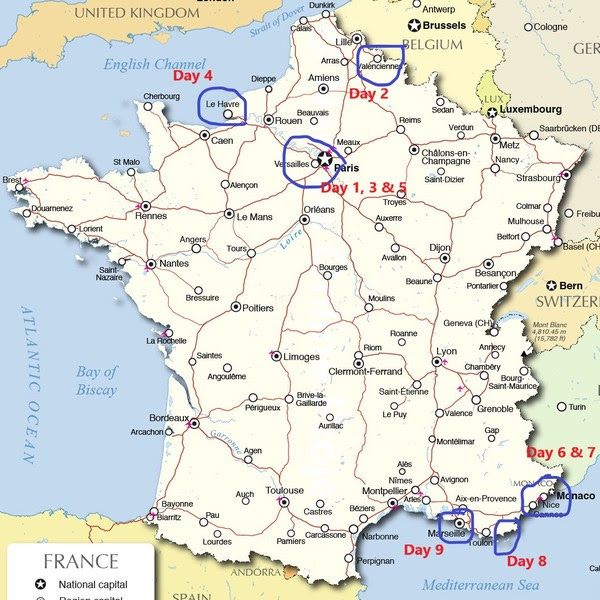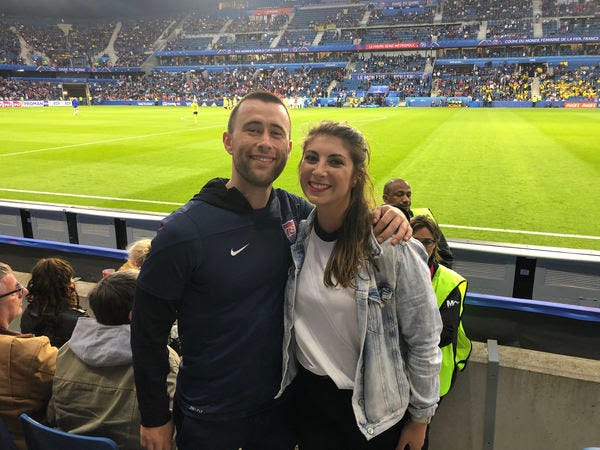Originally published on Revue - July 8, 2019
The Tea on the Women's World Cup
To the handful of you who look forward to receiving this newsletter regularly, I’m sorry it’s been so long. To the dozens who had grown tired of my drivel, be warned that the respite is over.
I got home last week from a trip to the Women’s World Cup in France with my girlfriend Candace. My suitcase is unpacked, but my takeaways have not been, and now seems as good a time as any to let the floodgates open on my creative juices.
In what will come as a surprise to exactly none of you, the plot lines and character developments that transpire across global soccer serve as allegories for how I attempt to make sense of our gloriously baffling world.
Four games in five nights across venues spanning various corners of the the French Hexagon breeds a deep appreciation for an efficient nationwide train system and for a girlfriend who embraces a helter-skelter dash between host cities as a legitimate way to spend her vacation days.
For a 20-something who is still experimenting with what he loves and what he’s good at, it was awe-inspiring to observe other 20-somethings who are such perfectionists, so goal driven, and so singularly focused on reaching the highest heights in their profession go to work. The eight teams we had the pleasure of watching comprised of plucky upstarts (Scotland, Argentina), trendy dark horse picks (Australia, Sweden), fallen powers (Brazil, Norway), a surprise overachiever (Italy), and women’s football juggernaut, the United States.
On one hand, the weight of expectations these women shoulder is not distributed equally. However, given that anytime female athletes are “extended the favor” of being given a visible platform, they are asked to perform a flawless balancing act between world class competitor, respected ambassador, and polished role model without adequate compensation, these footballers’ burdens begin closing resembling one another.
It feels strange that the following two monikers could coexist simultaneously, but having been a part of the festivities, I would describe the 2019 Women’s World Cup as both a monumental, high profile celebration of sporting and female excellence and an entrepreneurial but slapdash side project suffering from middle child syndrome.
For a 20-something who is still experimenting with what he loves and what he’s good at, it was awe-inspiring to observe other 20-somethings who are such perfectionists, so goal driven, and so singularly focused on reaching the highest heights in their profession go to work. The eight teams we had the pleasure of watching comprised of plucky upstarts (Scotland, Argentina), trendy dark horse picks (Australia, Sweden), fallen powers (Brazil, Norway), a surprise overachiever (Italy), and women’s football juggernaut, the United States.
On one hand, the weight of expectations these women shoulder is not distributed equally. However, given that anytime female athletes are “extended the favor” of being given a visible platform, they are asked to perform a flawless balancing act between world class competitor, respected ambassador, and polished role model without adequate compensation, these footballers’ burdens begin closing resembling one another.
It feels strange that the following two monikers could coexist simultaneously, but having been a part of the festivities, I would describe the 2019 Women’s World Cup as both a monumental, high profile celebration of sporting and female excellence and an entrepreneurial but slapdash side project suffering from middle child syndrome.
An underdog spirit emboldened revelers into random acts of gloriously grassroots fanfare (village opticians hanging Cameroon and New Zealand flags in their windows; French neutrals becoming die-hard Argentine patriots; young Aussie women orchestrating hundreds of multinationals in traditional chants) that I worry are becoming endangered in the hyper-cosmopolitan, avaricious men’s game. At an institutional level though, belittlement manifested far less wholesomely – group ticket purchasers found themselves scattered across the stadium, post game taxi lines stretched hundreds of people deep at 2 AM with no alternatives available, and infrequent, intermittent marketing efforts enabled sparse match attendance in some cities.
These grievances are symptoms of the macro-level narratives that dominated the coverage of the tournament. The grandeur of the spectacle over the last month served as a vibrant backdrop for conversations about gender equity, equal pay, “acceptable” protest, diversity in sport, and correlating growth with investment. Furthermore, the US Women winning once again is likely the best case scenario for ensuring progress on these issues powers forward.
But being at the matches allowed me to acutely appreciate the intensity of the micro-moments that fuel comebacks, flare tempers, and flip outcomes. I was stung by pangs of agony when Sam Kerr, the game’s most lethal attacking force, blazed her penalty over the bar in the shootout, incredulous when shocking refereeing decisions unhinged the already bewildering Scotland-Argentina match, and rapturous when the U.S.’ Lindsay Horan bundled home a corner against Sweden just as we were taking our seats. These visceral, haunting, delightful instants are why the game means so much to so many. As these professionals symbolize battles being fought across society, their decisive moments and poignant emotions on the pitch stand alone as wondrous too.
Attending both the Men’s and the Women’s World Cup have been two of the joys of my lifetime. Whatever your World Cup is, I hope you make it there someday, and please solicit my help if I could be of assistance in making this happen for you.
Host Family for Malawian Female Football Phenom?
Speaking of soliciting help and women’s soccer, I am reaching out to this beautiful assortment of worldly and important people to ask if anyone knows of a family who would be interested in being the host family for Lughano Nyondo, a bright, persevering young woman and gifted footballer arriving from Malawi to attend boarding school in Connecticut this fall.
In addition to my stuffy consulting job, I work as the Assistant Director for the US non-profit arm of Ascent Soccer, a Malawian academy offering pathways out of poverty for gifted young people. Lughano represents the second student and first female to have earned a scholarship to attend school overseas.
Lughano’s story is remarkable, as you can watch below. In the last three years, she has moved from a barebones village school to a local boarding school—where she finished top of her class—to Malawi’s strongest international school and now she heads to New England prep school.
She’ll be a boarding student, so her host family would be responsible for keeping her company on some weekends and holidays, helping her settle, accompanying her to appointments, and ideally attending some of her games when available. Therefore, it would be best if this family was based in the Northeast or Tri-state area.
All leads welcome. Many thanks.





